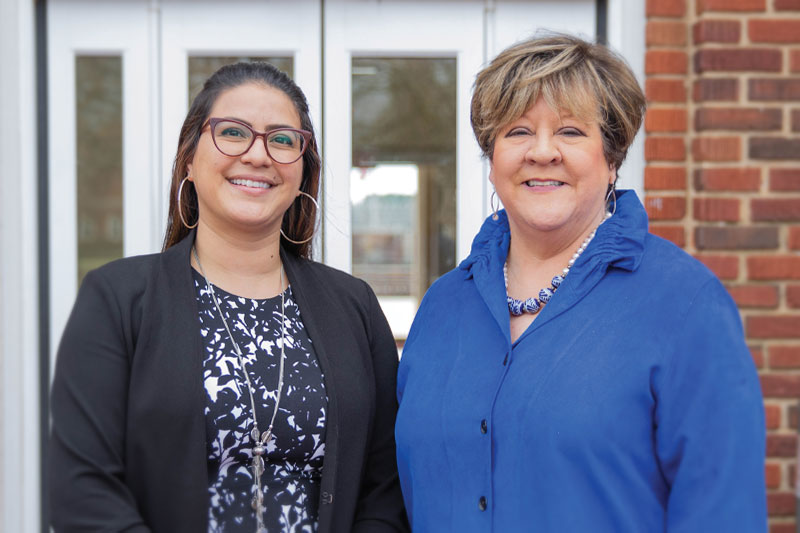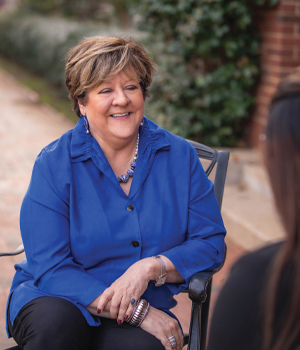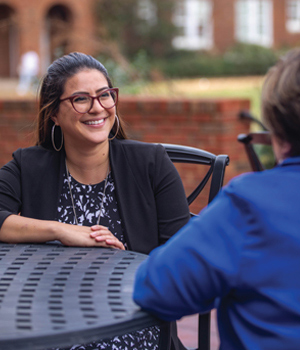
All Are Welcome Here
A Q&A with President Jo Allen, ’80, and DEI Coordinator Liliana Madrid
By Gaye Hill
All Are Welcome Here
A Q&A with President Jo Allen, ’80, and DEI Coordinator Liliana Madrid
By Gaye Hill
Just over one year ago, Meredith hired its first Diversity, Equity, and Inclusion Coordinator, Liliana Madrid, who reports directly to President Jo Allen, ’80. Meredith Magazine sat down with Allen and Madrid to learn about the College’s efforts over the past year toward making Meredith a more inclusive and welcoming environment for all.
Meredith Magazine (MM): Can we start by defining precisely what we mean when we talk about Diversity, Equity, and Inclusion (DEI) at Meredith?
Liliana Madrid (LM): So when we say diversity, we are usually asking who is in the room; when we say equity, we’re asking who is trying to get into the room but can’t. Inclusion asks if everyone’s ideas have been heard. And you will often hear DEIB, where the B stands for belonging, meaning everyone feels like a full member of the community. In my experience, creating a sense of belonging is more challenging.
When I was hired as the DEI Coordinator, it was clear that DEI is the responsibility of everyone at the institution. That means we don’t single out, “other,” or silo DEI work into one person’s position. It also means every single person forms a part of our community. And so, as coordinator, my role is to help with the initiatives and work with folks across campus who are either beginning or continuing to incorporate DEI initiatives into departments, offices, or programs.
MM: Can you tell me a little bit about the Student Collective?
LM: The Student Collective, which launched this fall, intentionally creates opportunities to share information and knowledge that I, as coordinator, may have about DEI work with students, and for students to share with me concerns or challenges. The goal is to ensure what I’m doing with employees matches the needs of student constituents. I’ve learned that our students weren’t necessarily familiar with all the work that other students are doing. We’re still getting to know and understand each other.
MM: DEI is a consistent component of the next iteration of Meredith’s strategic plan that’s being developed. Can you tell me why that’s so important?
 President Jo Allen (JA): If you recognize that the Board of Trustees has the ultimate say over the direction of the institution, then the strategic plan is their “marching orders” to me as president. What’s unique is that since I’ve been here, rather than the Board devising a strategic plan it has been a grassroots initiative in which we’ve talked at the foundational level about how we interact, what we’re committed to, and what we invest in that we want to preserve long term. Building DEI work into the strategic plan provides buy-in all along the way.
President Jo Allen (JA): If you recognize that the Board of Trustees has the ultimate say over the direction of the institution, then the strategic plan is their “marching orders” to me as president. What’s unique is that since I’ve been here, rather than the Board devising a strategic plan it has been a grassroots initiative in which we’ve talked at the foundational level about how we interact, what we’re committed to, and what we invest in that we want to preserve long term. Building DEI work into the strategic plan provides buy-in all along the way.
A top-down initiative doesn’t work. It’s most effective when people are doing the work that Liliana is describing of coming together, talking about what they see, what they’re experiencing, and what they need as resources. To me, that’s how you make a systemic difference in an institution.
Also, measurement is a huge piece that Liliana and I agree on – you have to be able to measure what you’re trying to accomplish.
MM: Liliana, how would you describe your approach to data?
LM: To me, data is a way of listening. You can track attendance, but it is also about capturing how participating in the experience impacted someone’s relationship with the institution. Capturing those experiences really helps advocate for DEI work.
For example, the number of employees participating in the Foundations certificate is only one piece of community engagement. Supporting employee success is the second, and that doesn’t always look the same for everyone.
A number of folks have been doing DEI work across campus. Their passion and commitment shows and now we get to support professional development opportunities for additional community members, because the work is valued. To be able to say we can provide programs is one part. To be able to say we have data that shows positive student experience is the second. It can be easy to only focus on a singular story; it is different to say we have comprehensive data and information that we can share with the community about our gaps and strengths – to offer continued growth opportunities based on the feedback, and to be able to track and show how we have been accountable. If there is doubt, we have the information to demonstrate how we are working towards the goal. This helps with accountability and trust quite a bit.
JA: I think in addition to that it really is about impact, as Liliana was saying. So if you know, for instance, that people may be reluctant to participate in a training because they’re afraid they’re going to be embarrassed or they don’t know the value of the training – start with the question, what do you want to get out of this workshop? That assessment of learning is where the real educational impact is most felt.
I’m in my 12th year as president. That means I’m going into my fourth generation of Meredith students. With every generation, there’s a tendency to forget that there was a generation prior to them, and prior to them, and so on. So when they say Meredith doesn’t do X, they may not know we actually have a long history of doing X – for instance, I think about how active our faculty were from the start of the civil rights movement.
Sometimes it’s hard for students to fully understand the community they’ve stepped into. For them, it’s brand new. And they want to put their own spin on their own experience. And that may be different from what the last generation of students needed just four years ago. As educators, it’s on us to remember that. This is a subject that is always evolving.
LM: In the DEI world, language is always evolving. I think back on some of the trainings I did 10 years ago and it’s fascinating to see how language has changed. I tell folks every time they come to a training if you’re under the impression this two-hour workshop will make you a subject matter expert, I’m sorry to disappoint you but that’s not going to happen. This is ongoing work, and every time you meet someone new, their lived experience is their truth.
JA: You know, really all of our interests or lifelong journeys – we are passionate about them because we continue to learn about them. Everyone’s field is evolving and I think it really shortchanges DEI work for people to come in with the expectation of “I’m going to take this one workshop and I don’t have to worry about my language anymore, it will all be taken care of.”
That lifelong piece is another way to remind ourselves that just like our language and our experiences are evolving, our perspectives on language and experiences evolve, too. And that’s why it’s so important to give yourself and others the grace needed to learn, to be able to ask questions, to be able to say, “you know I don’t understand the difference in these terms.”
MM: What are you excited about and what challenges do you see with regard to Meredith’s DEI work?
 LM: As a person, I know where most of the buildings are now. But being able to build relationships with partners across campus – and like any good relationship that takes time – I’m really excited to have had the opportunity to work with folks in different departments to ideate about possibilities, recognizing that change takes time and cultural change takes even more time. Feeling the support for that has been very rewarding.
LM: As a person, I know where most of the buildings are now. But being able to build relationships with partners across campus – and like any good relationship that takes time – I’m really excited to have had the opportunity to work with folks in different departments to ideate about possibilities, recognizing that change takes time and cultural change takes even more time. Feeling the support for that has been very rewarding.
For example, all these folks who are making the bias response process possible – that has taken time because it’s not just creating a button to submit a form. All the back-end pieces of how people have to work together and figure out what policies we have and how this plays into that. But it’s been received with nothing but support from the top down and bottom up. That has been really exciting for me to be able to say I get to work at an institution where folks are trying to do good work.
JA: I’m certainly excited about people coming together, but also I think the recognition that people are trying to get it right is exciting – when people are trying to be allies and build something measurable, to be able to say this is where we succeeded and where we still need to focus our attention. I really think the intentionality is what I find exciting, the partnerships and just the general sense of people really wanting to get this right.
What makes me anxious is whether we are overlooking something big. There are so many little things that can derail this work. Everything is important, and everybody’s experience is important. Owning what we can change and owning our efforts to make each other resilient is important. And at the end of the day, continuing to work on the change that needs to happen in our environment, in our language, and in our relationships.
LM: A challenge when we’re doing this work is the concern that I left someone out or there was a major stakeholder who wasn’t at the table. That’s challenging when you’re a new person because you don’t know all the stakeholders yet! So that’s been a learning curve for me. Making sure I know who I’ve missed, and what I’ve missed, and I know that’s only going to come with experience here. When you’re starting and building it takes a lot of time. Once programs are established and we’re refreshing and adding and evolving, it’s very different from creating from scratch, so I am excited for next year.
MM: How has it been working together on these initiatives?
LM: I appreciate President Allen’s transparency and guidance because there are things I do not know or historical context I may not have. There’s a freedom to say “Okay, where is the problem?” but also, “What’s a solution?”
We can talk about the problems but I also want to move us forward to what the action is and how we take that action.
With any partner, I recognize there are things they know about the institution that I may not be privy to, and so whatever pushback, feedback, or insight they provide me is never personal, it’s part of the process. My due diligence is to figure out a way to navigate that because, again, it’s not the individual, it’s a system, it’s an institution.
JA: I feel exactly the same. I can ask questions: “Where is this coming from? Who’s involved with this?” Liliana and I share a strong sense of the value of assessment. The value of asking critical questions and how we know we’re making a difference. If we’ve taken another step forward and we examine the subsequent data and say look, it did make a difference – that’s when you know you’re collecting your wins. When people say yes, this place is meeting my needs as a student, as an employee, and as a community because of the work that’s going on.
And because we share those values it allows us a lot more elasticity in our relationship so that it’s not the coordinator and the president, it’s Liliana and Jo. Liliana is a great problem solver and she really does see the big and the small details of what would make a difference because she asks the questions.
One other thing I have to say about working with Liliana is that it’s interesting to her and it’s not a competition. There is joy in the exploration of how we’re different and there’s joy in making people feel comfortable with difference and not afraid of it. I just think there’s so much about her personality and her approach that makes me feel our time together is about learning and it’s enjoyable even when it’s hard. To work with somebody in an area that is so difficult and so emotional, who sees the joy in teasing out ways to make change happen, that is education at its finest.
LM: I would say DEI is something we aspire to continually improve. One thing that comes up with belonging is natural segmentation, but you want to find ways to bring people together. For example, residential and commuter students, employees whose schedule can allow for participation in engagement opportunities. We create micro communities within the larger, but the goal is to create a place where everyone feels they belong.
A Sampling of Diversity, Equity, and Inclusion (DEI) Activities at Meredith
DEI Foundations Certificate
The certificate includes three two-hour workshops for employees that introduce foundational concepts and encourage reflection. Participants discuss, learn, and help build a more inclusive community.
- Exploring Subtle Acts of Exclusion
- Implicit Bias
- Cultural Consciousness
Building Inclusive Hiring Practices
- Implicit Bias Working Session
- DEI Hiring Responsibilities
Safe Zone
Opportunities to learn about LGBTQ+ identities, gender, and sexuality, and examine prejudice, assumptions, and privilege.
Advancing Accessibility Workshop Series
Workshops help faculty and staff understand individual and collective roles related to disability, gain skills to identify accessibility barriers, and strengthen advocacy and ally skills.
Bias Incident Response Team
The Bias Incident Response Team provides support resources to impacted parties and affirms the College’s commitment to diversity, equity, and inclusion.
Student Collective
Monthly meetings throughout the academic year to encourage discussion on new initiatives and emergent issues and to serve as a space for students to receive information on initiatives happening across campus.
A grant from the Jessie Ball duPont Fund has helped finance the first two years of DEI work at Meredith.
